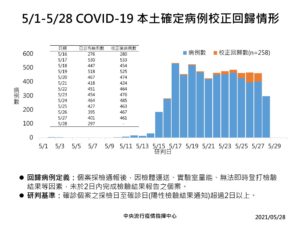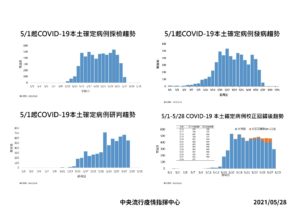by Brian Hioe
語言:
English
Photo Credit: lienyuan lee/WikiCommons/CC
297 DOMESTIC CASES of COVID-19, two imported cases, and 258 cases from the backlog were announced at the Central Epidemic Command Center’s (CECC) daily press conference today.
19 deaths were also reported, setting a new record for the daily deaths due to COVID-19, breaking yesterday’s records. A 36-year-old man in New Taipei that was found dead on the day he was set to be moved to a quarantine facility is the youngest death to date from COVID-19 in Taiwan, but the exact cause of death, such as whether he had any other medical conditions, is unknown.
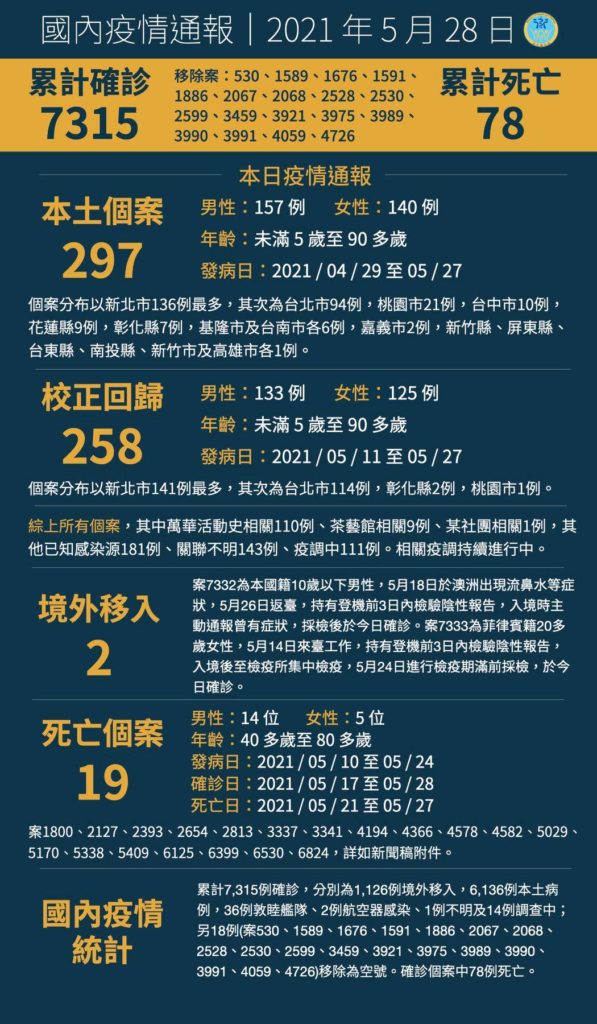 Infographic on the new cases announced today. Photo credit: Ministry of Health and Welfare/Facebook
Infographic on the new cases announced today. Photo credit: Ministry of Health and Welfare/Facebook
Of today’s cases, 136 cases were in New Taipei, with 94 cases in Taipei, 21 cases in Taoyuan, 10 cases in Taichung, nine cases in Hualien, and seven cases in Changhua. There were six cases each in Tainan and Keelung, two cases in Chiayi, and one case each in Hsinchu, Pingtung, Taitung, Nantou, Hsinchu, and Kaohsiung. Of the 258 cases from the backlog, 141 cases were in New Taipei, 114 cases in Taipei, two cases in Changhua, and one case in Taoyuan.
110 cases were linked to places in Wanhua. with 9 linked to tea houses. 181 cases had other causes, while 143 cases were of unknown origin.
According to Minister of Health and Welfare Chen Shih-chung, daily cases of COVID-19 seem to be consistent, with no explosion in cases. That being said, in examining the date of displayed symptoms, this may indicate a downward trend. Chen stated that the CECC believes that trends will become more clear by Tuesday, June 1st, and that it will report back then, with the possibility of adjustments in measures including a shift to a level four lockdown.
The conditions for triggering a level four lockdown are 14 days of more than 100 cases per day, with 50% of the cases having unclear origins; while the first condition has been met, the second condition has not been met. The original level three alert was set to last until today, before its extension to June 14th.
Chen stressed that rapid testing is still effective in determining cases, in spite of the potential to generate false positives. 73% to 75% of cases confirmed positive through rapid testing in the Greater Taipei area are later confirmed to have COVID-19, though this is lower in other areas, such as Taoyuan, Kaohsiung, and Hualien. Contact tracing is used in conjunction with rapid testing in order to find transmission chains.
Backlogs in reporting testing results, however, are not due to lack of testing capacity, but due to the processing of tests taking too long. Efforts are underway to make the process more efficient, with the integration of rapid testing information and PCR testing results in the National Health Insurance having made the process faster. Subsidies have been provided to local governments to boost testing.
Though there are plans to allow businesses to conduct rapid testing, the issue is that adequate facilities need to be in place for hospitalization at the same time. 37% of those currently positive for COVID-19 are in hospitals, with 33% in quarantine facilities, and 15% in strengthened quarantine facilities. 159 patients are on breathing machines.
180 hospitals have specialized wards for treating COVID-19, which is 9,015 beds. Originally, only 172 hospitals had specialized wards, with a total of 2,400 rooms, which is a similar number because rooms have more than one bed.
There are 2,800 beds in the greater Taipei region and 140 negative-pressure isolation wards, which the CECC states indicates sufficient medical resources, except for that they are dispersed across Taiwan. As such, the CECC is focused on trying to avoid certain hospitals being overburdened with cases, with some patients sent to southern Taiwan. Although it has been stressed that this is to alleviate the burden on northern Taiwan, one can expect some NIMBY responses from local residents, who do not want to take on COVID-19 patients in their communities or will accuse northern Taiwan or siphoning away their medical resources, in line with broader historical issues regarding uneven development in Taiwan.
As there are reports of patients refusing to be discharged from hospitals, the CECC stated that it hopes not to have to fine patients, but that this could be punished by between 60,000 NT to 300,000 NT in fines. As New Taipei previously claimed that it only had two hundred beds left, several hundred beds have been cleared, with 746 free beds as of yesterday. If more than beds are put in one room, that would result in more than 1,000 free beds. Nevertheless, there have been difficulties transitioning to free up hospital beds. There are some plans to expand hospital facilities with temporary structures.
The CECC previously announced yesterday that, of the 150,000 doses of the 410,400 AstraZeneca vaccines that arrived earlier this month, Taipei will be allocated 22,200 doses of vaccine, New Taipei will be allocated 18,000 doses, Taichung allocated 17,500 doses, and Kaohsiung 21,000. However, it was pointed out that despite Taipei and New Taipei being the most heavily affected areas, Kaohsiung would receive more doses than New Taipei—the CECC stated that this was because vaccines are prioritized for medical workers at present and rates of vaccination for medical workers in Kaohsiung were lower than in Taipei.
Nevertheless, the Tsai administration may need to avoid the accusation of favoring Kaohsiung, which is controlled by the DPP, over pan-Blue Taipei and New Taipei, which are the most heavily hit. As such, the CECC announced that for subsequent vaccine distribution, 56,500 doses would be sent to Taipei, 49,300 doses to New Taipei, and 33,800 doses to Kaohsiung, making a total of 79,200 doses sent to Taipei, 67,300 doses to New Taipei, and 54,800 doses to Kaohsiung. Apart from medical workers, other groups thought to be at the frontlines of COVID-19 prevention efforts will be prioritized, such as police and firefighters.
Data released by the CECC today. Photo credit: Ministry of Health and Welfare/Facebook
Chen Shih-chung stated that, with daily numbers relatively stable, efforts are focused on increasing testing at hot spots while preventing the spread of COVID-19 and trying to find any undetected transmission chains. Taipei mayor Ko Wen-je has stated that rates of infection at testing sites are on the decline, though this could also be due to fewer people coming to testing sites. New Taipei mayor Hou You-yi has also indicated stable, relatively lower rates of infection at testing sites.
Yet with the situation under control in Wanhua, according to Ko, there are fears that COVID-19 could have spread undetected to outside of Wanhua and to other districts of Taipei. As Ko stated, this is why the Taipei city government no longer publicizes the exact travel history for confirmed COVID-19 patients, because it does not want members of the public thinking they are safe if they do not have overlapping travel history with confirmed cases. That being said, when the CECC previously tried to shift to this policy, it was attacked by local governments with the accusation that it was trying to cover up information.
According to the Executive Yuan, relief measures for individuals and businesses affected by the current outbreak will begin to be distributed next week, with money sent out by June 4th. The Executive Yuan has announced that 210 billion NT will be allocated to COVID-19 relief, with affected groups such as farmers, fishermen, taxi drivers, and tour guides eligible for a one-time subsidy of 10,000 NT to 30,000 NT. Subsidies of 10,000 NT per child will also be sent to families with children at the elementary school age or below.
Businesses in the travel industry are likely to be heavily affected. 600 hostels and hotels in Taitung have voluntarily shut down, with hotel owners calling on the government to provide assistance.
Concerns about COVID-19 spreading among workers at Chunghwa Post continue, with a new Chunghwa Post worker confirmed positive. The worker in question is a postman in Neihu, adding to a previous case in Nangang yesterday. With concerns of tech companies in Taiwan being affected by COVID-19 spread, a Micron worker and his family in Taichung were also confirmed positive for COVID-19.
The shift to remote teaching has proved a challenge for many, due to frequent disconnections from online teaching platforms due to too many users. This has led the Keelung city government to add a new television channel of educational programs for children. The Ministry of Education has announced that activity fees and lunch fees will be suspended for June.
There are fears about COVID-19 spreading among students. There are currently 229 students that have been confirmed with COVID-19 as of this morning, with 82 students having caught COVID-19 on campus, and 45 elementary schoolers with COVID-19.
Travel websites on the Internet have begun to advertise tour groups to the US to get vaccinated and vacation. The Tourism Bureau has stated that this is illegal, however.
A company in Zhonghe in an industrial area forced an employee with a confirmed COVID-19 to continue to work two days, because the employee in question had been notified by the hospital of a positive test result, but not the Department of Health. Sometimes the hospital will first notify patients of COVID-19 diagnosis before the Department of Health does, due to limited capacity contacting patients.
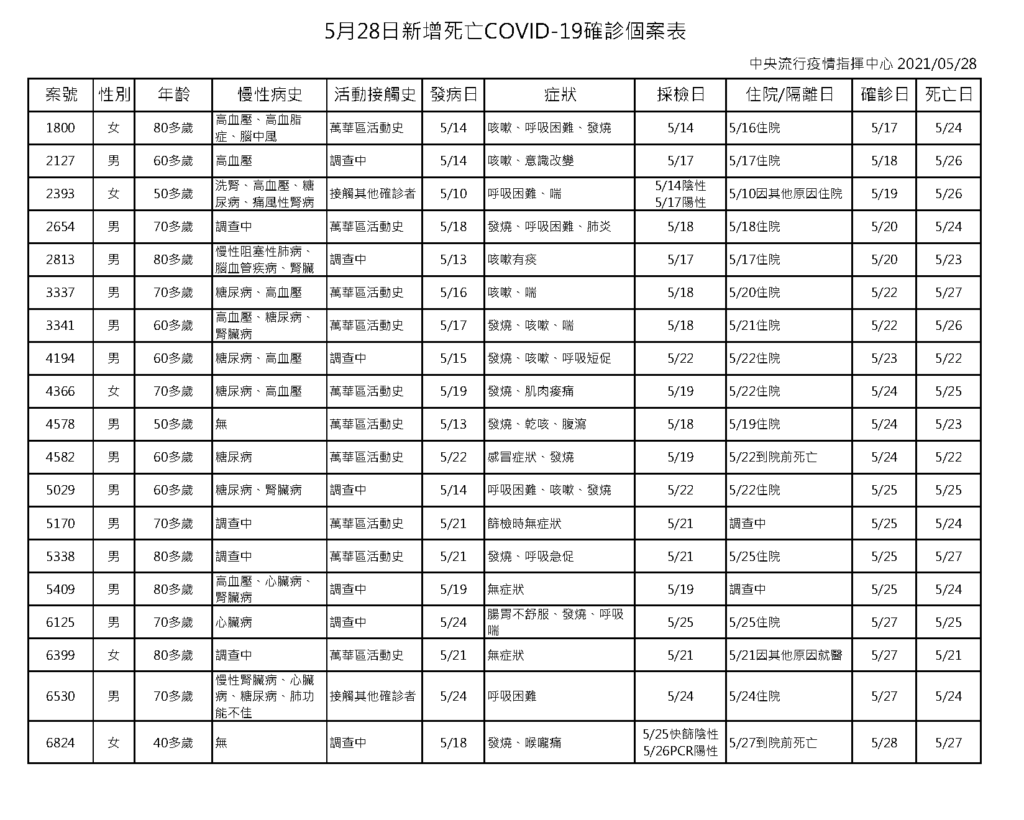 Data on the deaths announced today. Photo credit: Ministry of Health and Welfare/Facebook
Data on the deaths announced today. Photo credit: Ministry of Health and Welfare/Facebook
Nevertheless, it is now feared that the incident could lead to the spread of COVID-19 in the industrial area. The company’s actions could be punished with a one million NT fine. While companies have been called on to have flexible arrangements for employees, many are reluctant to do so, including not being willing to shift to remote work because this means that companies cannot have direct oversight over workers. More broadly, the current epidemic has highlighted many issues regarding Taiwan’s exploitative working culture, with companies continuing to try and force workers to work long hours in spite of when this impedes measures to fight against COVID-19.
With city mayors having pushed against the central government’s alert system, seeking to push their respective cities to measures closer to level three at a time in which the nation was still at level two, this has continued after the shift to level three near-lockdown conditions. Taipei mayor Ko Wen-je has stated that Taipei city intends to carry out exercises in preparation for level four. Likewise, while the CECC has stated that there is no “quasi-level four alert,” in the manner that city mayors claimed to be shifting to a “quasi-level three alert”, this has not prevented New Taipei mayor Hou You-yi from referring to a “quasi-level four.”
More broadly, the distinctions between level three and level four have become less distinct in the past days. On Wednesday, the CECC announced “strengthened” level three that included immediate fines for not wearing masks outdoors, and the suspension of indoor dining services for all restaurants, and businesses urged to shift to work from home arrangements. But a major distinction between level three and level four is that some night markets have been allowed to reopen and some traditional markets remain in operation, even as many have seen closures.
A report in the Mainichi Shimbun on May 28th suggests that the Japanese government is considering whether to send AstraZeneca vaccines to Taiwan, as early as next month. It is probable that vaccine shipments to Taiwan from regional allies, such as the US and Japan, may be used to affirm the strength of relations with Taiwan. The idea might play over well in Japanese domestic politics, particularly because of substantial financial contributions from members of the Taiwanese public to Japan after the 2011 Fukushima disaster. That being said, vaccination rates in Japan are low and the upcoming Tokyo Olympics will probably lead to an explosion of cases. This might prove an obstacle to Japan sending vaccines to Taiwan, with the Mainichi Shimbun article possibly being a trial balloon.
With 150,000 doses of the Moderna vaccine set to arrive today, the secrecy maintained by the Tsai administration in its vaccine purchases has been questioned. Some have accused the Tsai administration of lacking transparency, but the Tsai administration has defended the need for confidentiality, in case vaccine purchases are interfered with—possibly due to cases of political interference.
Pan-Blue mayors have often sought to dispute the Tsai administration’s measures taken against COVID-19 during the outbreak and it is known that they were not aware of the vaccine shipment. Taipei mayor Ko Wen-je was lashing out at America for not providing Taiwan with vaccines shortly before the imminent shipment was announced, for example. It is a question how deep splits between the central government and local governments run, with the possibility that the central government fears sabotage from local governments. In the past days, pan-Blue local governments have also called for being allowed to purchase Biontech vaccines from Fosun, Biontech’s Greater China market distributor.
The Chinese government has been accused of interfering with the Tsai administration’s attempts to purchase Biontech vaccines by Minister of Health and Welfare Chen Shih-chung in recent days. Pan-Blue mayors are likely counting on that the Chinese government will not interfere with vaccine purchases. Purchasing vaccines that the Tsai administration has been unable to would be a way of upstaging the Tsai administration and undermining its authority. To avoid the accusation from pan-Blue local governments that the CECC simply is hoping to monopolize authority over vaccine purchases, Chen publicized the process for purchasing vaccines today. Chen stated that vaccine purchases cannot go through unless vaccine companies are able to provide the right certification demonstrating they have authority to purchase vaccines.
Though FoxConn previously tried to buy vaccines from Fosun and was reportedly ready to buy five million doses, the deal fell apart at the last minute for reasons that are unclear. FoxConn is well-known for its pan-Blue leanings and so its attempt to purchase vaccines was also seen as an attempt to upstage the Tsai administration. But news of the deal falling through came from DPP majority speaker Ker Chien-ming, who stated that FoxConn CEO Terry Gou had approached him to request his assistance in the vaccine purchase.
If there is interference, it is possible that China intends to try and impede Taiwan from obtaining any vaccines as well. Otherwise, it is possible that China does not want to give Gou the political boost of facilitating the purchase of the Biontech vaccines for Taiwan, viewing Gou as somewhat of a wild card because he is not subordinate to the KMT party structure and is independently wealthy. Moves by Gou to work with Ker Chien-ming may be another reason why China is wary of Gou, though Ker is also known for his periodic willingness to work with members of the KMT. Likewise, Gou may have tried to circumvent Fosun by dealing directly with Biontech, though purchasing through Fosun’s quota of 100 million vaccine doses.
Nevertheless, longtime Gou aide Ann Kao, who is currently a TPP legislator, struck a different tone in public comments. Kao denied political interference in the deal and suggested that issues returned to the DPP’s “political attitude”, as well as that the deal was interfered with because news of it broke ahead of time. It is not clear to what extent Kao’s statements accurately reflect Gou’s views, due to Kao’s membership in the TPP, which is led by Taipei mayor Ko Wen-je.
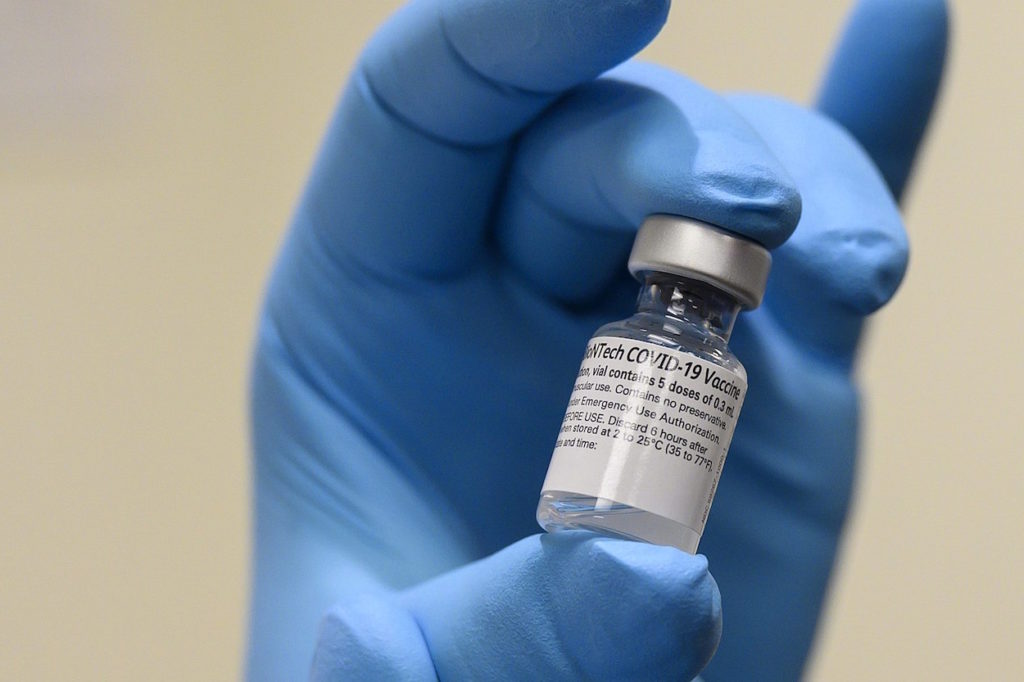 Photo credit: US Department of Defense/Public Domain
Photo credit: US Department of Defense/Public Domain
It is known that other tech companies besides FoxConn are interested in purchasing vaccines. It is not known which ones. But it is to be questioned whether TSMC, Taiwan’s semiconductor manufacturing giant, which is a key node in global supply chains, is involved.
The CECC’s timeline for vaccines arriving in Taiwan is two million vaccines set to arrive in June and ten million vaccines to be delivered by August. With the recent Moderna shipment, it is probable that the two million vaccines set to arrive in June are the Moderna vaccine. It is now known that the Tsai administration has placed two orders of five million doses with two domestic manufacturers, suggesting that the ten million vaccines to be delivered by August are domestic vaccines currently undergoing phase two trials.
Minister of Health and Welfare Chen Shih-chung stated that he hopes to get Taiwan to 60% vaccination, with international experience showing that suppressing the spread of COVID-19 is more effective when the public is 40% to 60% vaccinated. Chen stated that 20% to 40% vaccination had less of an effect preventing the spread of COVID-19.


